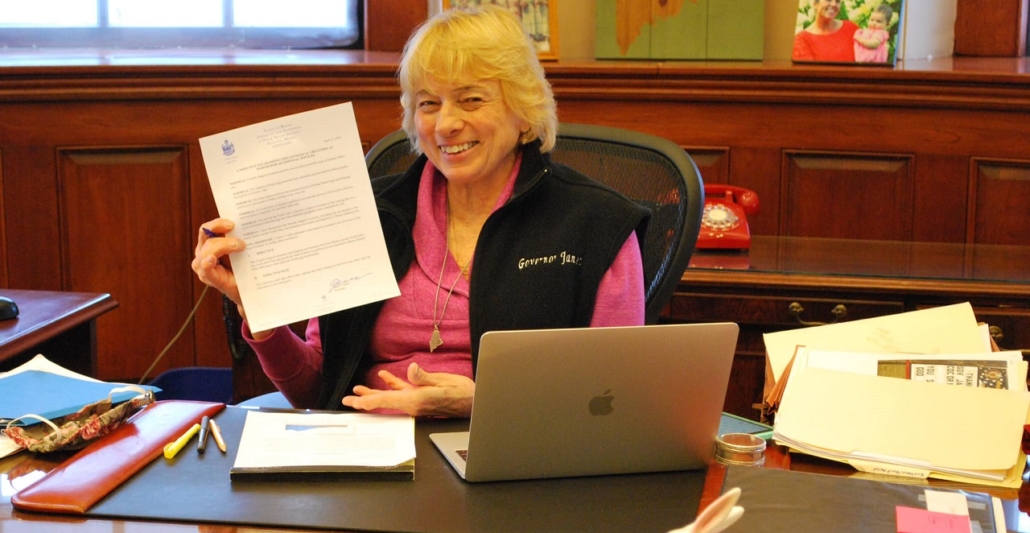China select board members again postponed a decision on whether some town officials should be elected from geographic districts, after a discussion with two planning board members who attended the June 20 select board meeting.
The select board’s agenda included numerous other topics. Two were related to the transfer station: a suggested new system for monitoring entering vehicles and a proposed contract with Albion.
Board members also scheduled a July 31 public discussion of the South China boat landing; approved contracts for cemetery fence work and with Delta Ambulance; gifted the old generator the town office no longer uses; and agreed on off-schedule meetings for the end of the fiscal year and the Independence Day holiday.
The district election system dates from 1986, Town Manager Rebecca Hapgood believes. Ordinances say four members each of the planning board and budget committee are elected from four districts in town, mapped as northwest, northeast, southeast and southwest.
The six-member planning board has one member and one alternate elected from the town at large. The seven-member budget committee has one member plus the chair and the secretary who can live anywhere in town. All China voters vote for all members of both boards.
Hapgood questioned the usefulness of the districts at the June 5 select board meeting (see the June 15 issue of The Town Line, p. 3), sparking the first discussion.
When select board members and planning board co-chairmen Toni Wall and James Wilkens resumed the discussion June 20, an early point Hapgood made was that the planning board has had trouble getting members from some districts. Select board member Brent Chesley said after he lost his first bid for election to the select board, he tried to volunteer for the planning board and was turned down because he did not live in the district with the unfilled seat.
But, Wilkens said, assuming – as speakers did – that the purpose of districts is to spread board membership throughout the town, abolishing districts won’t solve the problem: the area that doesn’t have volunteers still won’t have them.
Three residents receive Spirit of America awards
Three China residents were honored with Spirit of America awards at the June 20 China select board meeting.
Ronald Breton, former select board member and chairman, former member and chairman of the planning board and member of other committees, was recognized for his many years of volunteering. Current select board member Janet Preston called Breton “very sincere and caring about the Town of China.”
Frederick “Rick” Fischer was commended by board member Blane Casey for his conscientious care of Memorial Park, in South China. Casey estimated Fischer had volunteered his time and labor mowing and trimming the grounds and shrubs around the monument for 30 years.
Trishea Story was recognized by Town Manager Rebecca Hapgood for her many years as an election worker for the town, as well as her membership on town committees.
The half-hour discussion canvassed other possibilities, including changing district boundaries and allowing temporary appointments from out of district. Wall volunteered to draft possible ordinance revisions as a basis for continued discussion.
The first transfer station issue was the proposed revised identification system, involving the current RFID (radio frequency identification) tags plus annual stickers on the tags, with vehicle license plate numbers on them (see again the June 15 issue of The Town Line, p. 3).
Hapgood said she is still trying to resolve one point that generated much discussion: the plan as proposed calls for charging China residents $10 for a RFID tag (she said the town pays about $7 to buy each tag, and invests staff time), but under the contract that lets Palermo use China’s transfer station, Palermo residents cannot be charged new fees.
The Town of Palermo makes an annual payment to China, and Palermo residents pay for colored bags for their mixed waste.
Transfer station committee members (there are two Palermo representatives on the eight-person committee) will continue discussion, Hapgood said, aiming for a system accepted as equitable.
A proposed contract to let Albion residents bring to China waste that is excluded from their curbside collection – metal, demolition debris, televisions, refrigerators and the like – was not controversial. The contract Michael Gardner, chairman of Albion’s select board, and Hapgood negotiated sets fees for each category that Hapgood said will cover China’s handling and disposal costs and provide a small profit.
Albion residents will need a pass, so a China transfer station staff member can collect the fees. Hapgood does not expect enough Albion waste to increase volume noticeably.
The contract is intended as an experiment, Hapgood said. It extends only to the end of 2023, and can be terminated on two weeks’ notice.
Select board members approved it unanimously.
Select board member Janet Preston reported on the survey of ways to use a community resilience grant, if the town were to get one. Of 274 respondents, 190 ranked addressing erosion and pollution at the South China boat landing a worthwhile project – the most popular of the seven projects offered, Preston said.
Select board members scheduled a public meeting to talk about options for the landing for 5:30 p.m. Monday, July 31, before that evening’s select board meeting.
Margot Crosman, who lives next to the landing, zoomed in to the board meeting to applaud plans for a public meeting. She said a group called the South China Neighbors Association is organizing around the topic, and pointed out that the landing is used by swimmers as well as by people launching boats.
Select board members made two more unanimous decisions:
- They accepted a contract with Delta Ambulance service, at the fee previously discussed and included in the 2023-24 budget, for a year’s ambulance service. Hapgood said town attorney Amanda Meader had reviewed the contract.
- They accepted the lower of two bids for cemetery fence repairs, from Triple P Fence Company, of Augusta. The bid is $11,205, with $400 to be added if Triple P personnel have to remove old fences because China’s public works crew have no time. Hapgood said the cemeteries to get new fences this year are Lakeview, China Village Extension and Stanley Hill.
The decision to donate the unneeded old generator to the building in the China School Forest was on a 4-1 vote, with Chesley dissenting. Board chairman Wayne Chadwick agreed that a generator is a less costly option than running electricity to the building, but was concerned about future costs. He nonetheless voted for the gift.
The next two China select board meetings are scheduled for 3 p.m. Friday, June 30, to approve any final FY 2023-24 payments; and 7:30 a.m. Wednesday, July 5, to avoid the holiday weekend and let select board members get to work the day after the holiday. The preliminary agenda for the July 5 meeting includes only payment of necessary bills.
The China town office will close at noon Friday, June 30. All town departments will be closed all day Tuesday, July 4. A regular select board meeting is scheduled for 6:30 p.m. Monday, July 17.
Poll results
Results of the poll asking China voters to rank projects that might be funded with community resilience grants were as follows, according to Janet Preston, the town’s representative to the Kennebec Valley Council of Governments.
Respondents were asked to choose three top priorities. Of 274 people who answered the survey, 190 checked addressing erosion and pollution at the South China board landing. Next most favored was providing transportation for senior citizens, with 133 votes, followed by improving and expanding Thurston Park (109); digitizing town records (101); building sidewalks on Main Street in China Village (92); adding solar panels on municipal buildings (83); and providing electric vehicle charging stations (37). Sixteen other ideas were written in.
Preston told the rest of the select board at the June 20 board meeting that this information lets her complete an application to become one of KVCOG’s community resilience partners. After KVCOG accepts the application, the town will become eligible to apply for grants.
 by Mary Grow
by Mary Grow






